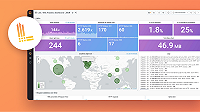Caution
Grafana Agent has reached End-of-Life (EOL) on November 1, 2025. Agent is no longer receiving vendor support and will no longer receive security or bug fixes. Current users of Agent Static mode, Agent Flow mode, and Agent Operator should proceed with migrating to Grafana Alloy. If you have already migrated to Alloy, no further action is required. Read more about why we recommend migrating to Grafana Alloy.
Important: This documentation is about an older version. It's relevant only to the release noted, many of the features and functions have been updated or replaced. Please view the current version.
loki.source.podlogs
loki.source.podlogs discovers PodLogs resources on Kubernetes and, using
the Kubernetes API, tails logs from Kubernetes containers of Pods specified by
the discovered them.
loki.source.podlogs is similar to loki.source.kubernetes, but uses custom
resources rather than being fed targets from another Flow component.
NOTE: Unlike
loki.source.kubernetes, it is not possible to distribute responsibility of collecting logs across multiple agents. To avoid collecting duplicate logs, only one agent should be running aloki.source.podlogscomponent.
NOTE: Because
loki.source.podlogsuses the Kubernetes API to tail logs, it uses more network traffic and CPU consumption of Kubelets thanloki.source.file.
Multiple loki.source.podlogs components can be specified by giving them
different labels.
Usage
loki.source.podlogs "LABEL" {
forward_to = RECEIVER_LIST
}Arguments
The component starts a new reader for each of the given targets and fans out
log entries to the list of receivers passed in forward_to.
loki.source.podlogs supports the following arguments:
loki.source.podlogs searches for PodLogs resources on Kubernetes. Each
PodLogs resource describes a set of pods to tail logs from.
PodLogs custom resource
The PodLogs resource describes a set of Pods to collect logs from.
NOTE:
loki.source.podlogslooks forPodLogsofmonitoring.grafana.com/v1alpha2, and is not compatible withPodLogsfrom the Grafana Agent Operator, which are versionv1alpha1.
PodLogsSpec
PodLogsSpec describes a set of Pods to collect logs from.
If selector is left as the default value, all Pods are discovered. If
namespaceSelector is left as the default value, all Namespaces are used for
Pod discovery.
The relabelings field can be used to modify labels from discovered Pods. The
following meta labels are available for relabeling:
__meta_kubernetes_namespace: The namespace of the Pod.__meta_kubernetes_pod_name: The name of the Pod.__meta_kubernetes_pod_ip: The pod IP of the Pod.__meta_kubernetes_pod_label_<labelname>: Each label from the Pod.__meta_kubernetes_pod_labelpresent_<labelname>:truefor each label from the Pod.__meta_kubernetes_pod_annotation_<annotationname>: Each annotation from the Pod.__meta_kubernetes_pod_annotationpresent_<annotationname>:truefor each annotation from the Pod.__meta_kubernetes_pod_container_init:trueif the container is anInitContainer.__meta_kubernetes_pod_container_name: Name of the container.__meta_kubernetes_pod_container_image: The image the container is using.__meta_kubernetes_pod_ready: Set totrueorfalsefor the Pod’s ready state.__meta_kubernetes_pod_phase: Set toPending,Running,Succeeded,FailedorUnknownin the lifecycle.__meta_kubernetes_pod_node_name: The name of the node the pod is scheduled onto.__meta_kubernetes_pod_host_ip: The current host IP of the pod object.__meta_kubernetes_pod_uid: The UID of the Pod.__meta_kubernetes_pod_controller_kind: Object kind of the Pod’s controller.__meta_kubernetes_pod_controller_name: Name of the Pod’s controller.
In addition to the meta labels, the following labels are exposed to tell
loki.source.podlogs which container to tail:
__pod_namespace__: The namespace of the Pod.__pod_name__: The name of the Pod.__pod_container_name__: The container name within the Pod.__pod_uid__: The UID of the Pod.
Blocks
The following blocks are supported inside the definition of
loki.source.podlogs:
The > symbol indicates deeper levels of nesting. For example, client > http_client_config refers to an http_client_config block defined
inside a client block.
client block
The client block configures the Kubernetes client used to tail logs from
containers. If the client block isn’t provided, the default in-cluster
configuration with the service account of the running Grafana Agent pod is
used.
The following arguments are supported:
http_client_config block
The http_client_config block configures settings used to connect to the
Kubernetes API server.
bearer_token, bearer_token_file, basic_auth, authorization, and
oauth2 are mutually exclusive and only one can be provided inside of a
http_client_config block.
selector block
The selector block describes a Kubernetes label selector for PodLogs or
Namespace discovery.
The following arguments are supported:
When the match_labels argument is empty, all resources will be matched.
match_expression block
The match_expression block describes a Kubernetes label match expression for
PodLogs or Namespace discovery.
The following arguments are supported:
The operator argument must be one of the following strings:
"In""NotIn""Exists""DoesNotExist"
Both selector and namespace_selector can make use of multiple
match_expression inner blocks which are treated as AND clauses.
Exported fields
loki.source.podlogs does not export any fields.
Component health
loki.source.podlogs is only reported as unhealthy if given an invalid
configuration.
Debug information
loki.source.podlogs exposes some target-level debug information per target:
- The labels associated with the target.
- The full set of labels which were found during service discovery.
- The most recent time a log line was read and forwarded to the next components in the pipeline.
- The most recent error from tailing, if any.
Debug metrics
loki.source.podlogs does not expose any component-specific debug metrics.
Example
This example discovers all PodLogs resources and forwards collected logs to a
loki.write component so they are can be written to Loki.
loki.source.podlogs "default" {
forward_to = [loki.write.local.receiver]
}
loki.write "local" {
endpoint {
url = env("LOKI_URL")
}
}


